#radical black studies
Text
In this incarnation, she appears in the archive of slavery as a dead girl named in a legal indictment against a slave ship captain tried for the murder of two Negro girls. But we could have as easily encountered her in a ship’s ledger in the tally of debits; or in an overseer’s journal—‘last night I laid with Dido on the ground’; or as an amorous bed-fellow with a purse so elastic ‘that it will contain the largest thing any gentleman can present her with’ in Harris’s List of Covent-Garden Ladies; or as the paramour in the narrative of a mercenary soldier in Surinam; or as a brothel owner in a traveler’s account of the prostitutes of Barbados; or as a minor character in a nineteenth-century pornographic novel. Variously named Harriot, Phibba, Sara, Joanna, Rachel, Linda, and Sally, she is found everywhere in the Atlantic world. The barracoon, the hollow of the slave ship, the pest-house, the brothel, the cage, the surgeon’s laboratory, the prison, the cane-field, the kitchen, the master’s bedroom—turn out to be exactly the same place and in all of them she is called Venus.
—Saidiya Hartman, “Venus in Two Acts” (2008)
#saidiya hartman#say her name#radical black studies#black feminist theory#Venus#gender and slavery#cultural studies#israel#palestine#higher education#afterlives#in the wake
1 note
·
View note
Text

assata is such a powerful autobiography and it’s giving me more to think of as i think of what i will concentrate on for my english ma
#study#gradblr#grad school#grad student#studyblr#booklr#bookblr#assata#blacklivesmatter#assata shakur#black radical#black revolutionary#revolutionary texts#reading#reading journal#reading aesthetic#am reading#currently reading#litblr#literature
127 notes
·
View notes
Text
The amount of popular white and non black leftists I've had to block for being antiblack as fuck this week is genuinely ridiculous. It fills me with so much fucking shame and anger as a non black person having to see it be perpetuated over and over again from those within my specific community and outside of it. Like why is it so fucking hard for y'all to give a fuck about Black people as people? Why can you not respect the history and the continued history of Black activism, especially given how much radical action and history is so influenced by it? The answer is quite simple, and no matter how much you'd deny it: you're all fucking racist.
What I find sickeningly ironic too, is that so many of you are perpetuating this shit in Bushnell's name. Who, from what I've seen and read of him, was compelled to educate himself on the US's history of state sanctioned violence after the murder of George Floyd. His friends have said enough as well to indicate (and quite literally said) he had an awareness of his privilege as a white man in larger society, and perhaps more of you should take that lesson from him and from his actions too. This kind of behavior and constant reframing of Black anger and frustration at antiblackness as a "psyop" is disgusting, and the tarnishing of Bushnell's name with the perpetuation of that antiblackness in it is a fucking disgrace. You should all feel fucking ashamed of yourselves, but knowing how so far up your own asses some of you are....
#im genuinely convinced that on top of racism#so many of these people are so insecure about the fact#that all their huffed up 'radicalism' is a fucking shame in the face of Black people's mere life experiences#and it fucking eats at them because i genuinely think so many white leftists#literally just use leftistism as another fucking thing to put themselves on a high horse#its all theory its all talk at the end of the day#Black people know true radicalism in a way they never will because they do not have the privilege of backing away#they dont have the option to ever stop fighting because its a literal matter of survival and not just study!!!!!!#i meant sham but hell shame works too...
15 notes
·
View notes
Text
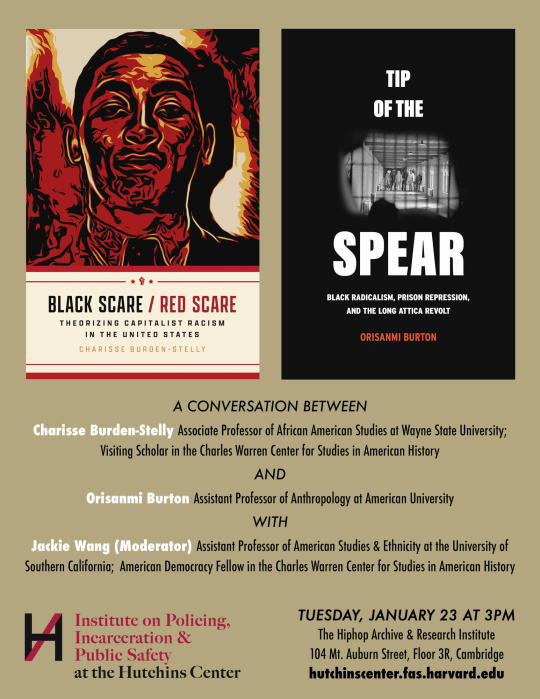
Moderating a conversation at Harvard with the authors of two of my most anticipated books of the year: Charisse Burden-Stelly's Black Scare / Red Scare and Orisanmi Burton's The Tip of the Spear.
Jan 23, 3pm at the Hiphop Archive. More info here:
https://hutchinscenter.fas.harvard.edu/event/conversation-burden-stelly-burton?delta=0
#communism#carceral studies#event#events#abolition#Orisanmi Burton#charisse burden-stelly#black communists#attica revolt#black radicalism#attica uprising#prisons
9 notes
·
View notes
Text
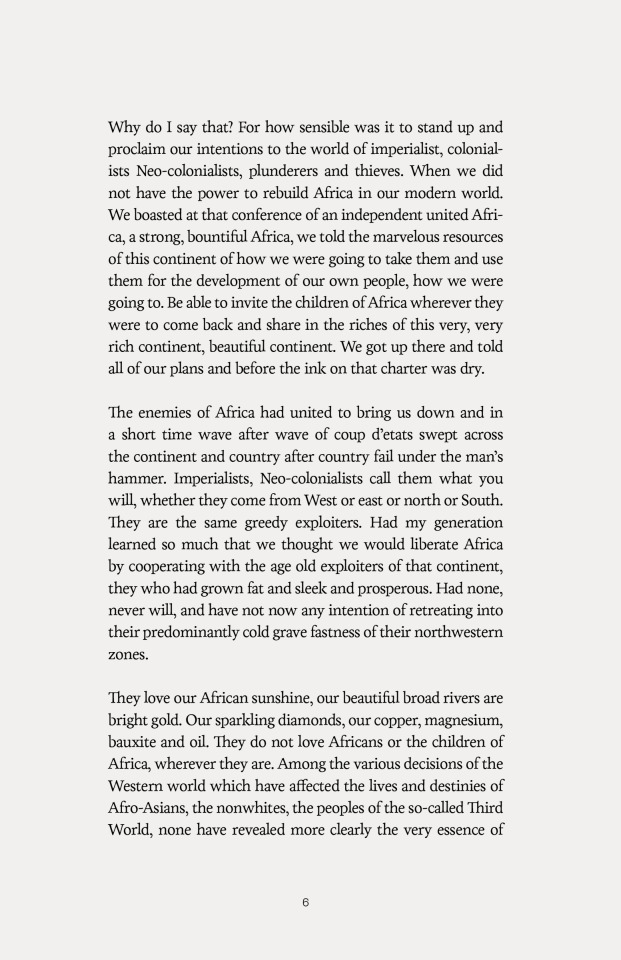
Shirley Graham Du Bois, Imperialism, Neocolonialism, and Africa, [transcribed audio speech given after returning from Africa by Shirley Graham Du Bois at UCLA, November 13, 1970], Color Collective Press, Los Angeles, CA, 2023, pp. 6-7

«[…] South Africa and Palestine land some 3500 miles apart, but each the concern of the same imperialist interests – each sacrificed in the name of western peoples and British Empire building.» – (p. 7)
Plus: Solidarity with Palestine Reading List by Black Women Radicals
#graphic design#typography#speech#pamphlet#book#cover#book cover#shirley graham du bois#ucla communication studies department#color collective press#abolition notes#black women radicals#1970s#2020s
11 notes
·
View notes
Text
The evolution of my thinking comes from a combination of elevating my own political education by reading the works of Black radical thinkers and being in conversation with Black radical organizers. These are the types of experiences that helped to inform the work and political framework of Know Your Rights Camp, a nonprofit organization I co-founded in service of building power in our communities.
Colin Kaepernick in interview with Indigo Oliver in The New Republic. “Black History Is an Absolute Necessity.”
A conversation with Colin Kaepernick on Black studies, white supremacy, and capitalism
Our History Has Always Been Contraband: In Defense of Black Studies. Edited by Colin Kaepernick, Robin D. G. Kelley, and Keeanga-Yamahtta Taylor
Haymarket Books is a great book publisher and they're offering this book as a free Ebook. It's important to support organizations like Haymarket.
11 notes
·
View notes
Text
In the excess is where becoming occurs, and becoming’s inherent nonconformity with being and its sedimented logics act as fertile (demonic) ground for those who might be. Trans/figuration is an ode to those who are not yet permitted to be here but insist on persisting anyway. It attests to not finding or discovering, but cultivating room for the unanticipated to emerge. We are given the honor of awaiting those holographic and hieroglyphic mobilities that might come.
We cannot anticipate subjectivities to come, or even rightly call them “bodies,” because it accosts our agreed-upon requirements for sufficient identification. Indeed, the subject as it might come, as it might emerge, cannot be known beforehand and thus might always—out of definitional necessity—be castigated for its inadequacy, its wrongness. But it is this gesture of subjective wrongness that we must embrace if we are to engender the onset of radically reorienting what might be.
Marquis Bey, Black Trans Feminism.
[emphasis added; breaks added for accessibility]
#marquis bey#mine#transmad#readings#embodiment#phenomenology#trans#gender#gender abolition#abolition#btw the use of 'demonic ground' is a nod to katherine mckittrick another amazing scholar of the Black feminist digital humanities/#radical pedagogical/citational studies
16 notes
·
View notes
Text
Thinking of writing a fic between Tom and Greg to raise awareness of what’s happening with Reddit and their absolutely absurd treatment of third party apps
#so here’s the deal if you want it simplified#Reddit is basically making it impossible for third party apps to exist#so by the end of the month there will only be 1 Reddit app#‘what’s the problem with that’ you might ask#well let me tell you- because this domino effect doesn’t look good at all#basically most modertors on Reddit use third party apps to moderate because the Reddit app does not give them the tools they need#now that they’re losing their tools moderation will be extremely difficult#which means inability to combate misinformation radicalization and hate speech online#and the very very awful cherry on top?#language prediction models get most of their learning from Reddit#so AI will be learning from a platform that quickly devolves into lies and hate speech#the same AI that we are beginning to incorporate into our everyday life#this is me screaming ICEBERG ICEBERG#hopefully reddits black out protest get something done because the internet ecosystem is about to enter the dark ages#I’m know I sound a bit alarmist#as someone who studies technology and misinformation at Georgetown please believe me when I say this will be a massive problem#the only solution would be for Reddit to reduce the API prices they’re charging#because we are going to enter a new era of misinformation with the addition of AI
2 notes
·
View notes
Text
“As an expression of love as radical responsibility, mutual comradeship guides activism and organizing in the Black radical tradition and helps to bridge strategic unity and productive conflict. It does all this in specifically political circumstances, with a specific political goal: the process of envisioning and striving to build a world beyond racial capitalism and imperialism—and of weathering the inevitable backlash for doing so. Moving beyond shared ideology, mutual comradeship is simultaneously an ethical, epistemological, and political practice of solidarity. Ethically, it emanates from the guiding principle of courage—the willingness to place oneself at risk for the betterment of others and shared values of cooperative social activity, a common conception of social transformation rooted in the eradication of racial capitalism, and the establishment and maintenance of expectations and standards through consistent struggle, debate, criticism, and self-criticism. These ethics are in the service of protecting, preserving, and valuing not only movements and organizations, but also each other.”
Charisse Burden-Stelly, “Settle Your Quarrels” (2023)
#charisse burden-stelly#mutual comradeship#black studies#black politics#solidarity#love#boston review#black political economists#black radical tradition#african diaspora studies#black communism
0 notes
Text
The World's Forests Are Doing Much Better Than We Think
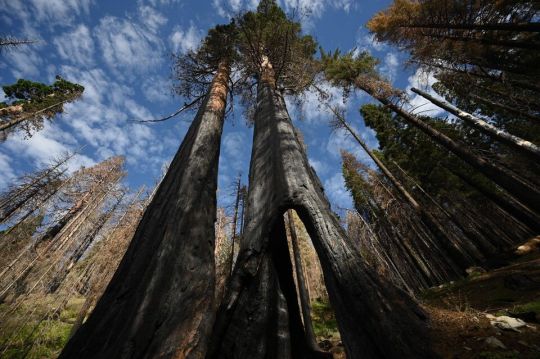
You might be surprised to discover... that many of the world’s woodlands are in a surprisingly good condition. The destruction of tropical forests gets so much (justified) attention that we’re at risk of missing how much progress we’re making in cooler climates.
That’s a mistake. The slow recovery of temperate and polar forests won’t be enough to offset global warming, without radical reductions in carbon emissions. Even so, it’s evidence that we’re capable of reversing the damage from the oldest form of human-induced climate change — and can do the same again.
Take England. Forest coverage now is greater than at any time since the Black Death nearly 700 years ago, with some 1.33 million hectares of the country covered in woodlands. The UK as a whole has nearly three times as much forest as it did at the start of the 20th century.
That’s not by a long way the most impressive performance. China’s forests have increased by about 607,000 square kilometers since 1992, a region the size of Ukraine. The European Union has added an area equivalent to Cambodia to its woodlands, while the US and India have together planted forests that would cover Bangladesh in an unbroken canopy of leaves.
Logging in the tropics means that the world as a whole is still losing trees. Brazil alone removed enough woodland since 1992 to counteract all the growth in China, the EU and US put together. Even so, the planet’s forests as a whole may no longer be contributing to the warming of the planet. On net, they probably sucked about 200 million metric tons of carbon dioxide from the atmosphere each year between 2011 and 2020, according to a 2021 study. The CO2 taken up by trees narrowly exceeded the amount released by deforestation. That’s a drop in the ocean next to the 53.8 billion tons of greenhouse gases emitted in 2022 — but it’s a sign that not every climate indicator is pointing toward doom...
More than a quarter of Japan is covered with planted forests that in many cases are so old they’re barely recognized as such. Forest cover reached its lowest extent during World War II, when trees were felled by the million to provide fuel for a resource-poor nation’s war machine. Akita prefecture in the north of Honshu island was so denuded in the early 19th century that it needed to import firewood. These days, its lush woodlands are a major draw for tourists.
It’s a similar picture in Scandinavia and Central Europe, where the spread of forests onto unproductive agricultural land, combined with the decline of wood-based industries and better management of remaining stands, has resulted in extensive regrowth since the mid-20th century. Forests cover about 15% of Denmark, compared to 2% to 3% at the start of the 19th century.
Even tropical deforestation has slowed drastically since the 1990s, possibly because the rise of plantation timber is cutting the need to clear primary forests. Still, political incentives to turn a blind eye to logging, combined with historically high prices for products grown and mined on cleared tropical woodlands such as soybeans, palm oil and nickel, mean that recent gains are fragile.
There’s no cause for complacency in any of this. The carbon benefits from forests aren’t sufficient to offset more than a sliver of our greenhouse pollution. The idea that they’ll be sufficient to cancel out gross emissions and get the world to net zero by the middle of this century depends on extraordinarily optimistic assumptions on both sides of the equation.
Still, we should celebrate our success in slowing a pattern of human deforestation that’s been going on for nearly 100,000 years. Nothing about the damage we do to our planet is inevitable. With effort, it may even be reversible.
-via Bloomburg, January 28, 2024
#deforestation#forest#woodland#tropical rainforest#trees#trees and forests#united states#china#india#denmark#eu#european union#uk#england#climate change#sustainability#logging#environment#ecology#conservation#ecosystem#greenhouse gasses#carbon emissions#climate crisis#climate action#good news#hope
3K notes
·
View notes
Note
how do i start to read marxist leninist/leftist stuff ? i searched on the internet but it’s super confusing lol
the most important value for me as an ML is anti-imperialism, so i guess i'll always recommend that people start with works centred on that
some suggestions below (all books should be available either on marxist.org or as pdf/epub files on libgen)
American Holocaust by David E. Stannard
about the colonization of america. not explicitly marxist, but it's probably done more to radicalize me than any other piece of writing. this is the pile of corpses capitalism is built on:
Within no more than a handful of generations following their first en counters with Europeans, the vast majority of the Western Hemisphere's native peoples had been exterminated. The pace and magnitude of their obliteration varied from place to place and from time to time, but for years now historical demographers have been uncovering, in region upon region, post-Columbian depopulation rates of between 90 and 98 percent with such regularity that an overall decline of 95 percent has become a working rule of thumb. What this means is that, on average, for every twenty natives alive at the moment of European contact-when the lands of the Americas teemed with numerous tens of millions of people-only one stood in their place when the bloodbath was over.
To put this in a contemporary context, the ratio of native survivorship in the Americas following European contact was less than half of what the human survivorship ratio would be in the United States today if every single white person and every single black person died. The destruction of the Indians of the Americas was, far and away, the most massive act of genocide in the history of the world. That is why, as one historian aptly has said, far from the heroic and romantic heraldry that customarily is used to symbolize the European settlement of the Americas, the emblem most congruent with reality would be a pyramid of skulls.
- David E. Stannard
2. Imperialism: The Highest Stage of Capitalism by Vladimir Lenin
Imperialism is capitalism at that stage of development at which the dominance of monopolies and finance capital is established; in which the export of capital has acquired pronounced importance; in which the division of the world among the international trusts has begun, in which the division of all territories of the globe among the biggest capitalist powers has been completed.
- Vladimir Lenin
3. The Wretched of The Earth by Franz Fanon
Let us look at ourselves, if we can bear to, and see what is becoming of us. First, we must face that unexpected revelation, the strip-tease of our humanism. There you can see it, quite naked, and it’s not a pretty sight. It was nothing but an ideology of lies, a perfect justification for pillage; its honeyed words, its affectation of sensibility were only alibis for our aggressions. A fine sight they are too, the believers in non-violence, saying that they are neither executioners nor victims. Very well then; if you’re not victims when the government which you’ve voted for, when the army in which your younger brothers are serving without hesitation or remorse have undertaken race murder, you are, without a shadow of doubt, executioners. And if you chose to be victims and to risk being put in prison for a day or two, you are simply choosing to pull your irons out of the fire. But you will not be able to pull them out; they’ll have to stay there till the end. Try to understand this at any rate: if violence began this very evening and if exploitation and oppression had never existed on the earth, perhaps the slogans of non-violence might end the quarrel. But if the whole regime, even your non-violent ideas, are conditioned by a thousand-year-old oppression, your passivity serves only to place you in the ranks of the oppressors.
- prefrace by Jean-Paul Sartre
4. Discourse on Colonialism by Aimé Césaire
Yes, it would be worthwhile to study clinically, in detail, the steps taken by Hitler and Hitlerism and to reveal to the very distinguished, very humanistic, very Christian bourgeois of the twentieth century that without his being aware of it, he has a Hitler inside him, that Hitler inhabits him, that Hitler is his demon, that if he rails against him, he is being inconsistent and that, at bottom, what he cannot forgive Hitler for is not crime in itself, the crime against man, it is not the humiliation of man as such, it is the crime against the white man, the humiliation of the white man, and the fact that he applied to Europe colonialist procedures which until then had been reserved exclusively for the Arabs of Algeria, the coolies of India, and the blacks of Africa
I have talked a good deal about Hitler. Because he deserves it: he makes it possible to see things on a large scale and to grasp the fact that capitalist society, at its present stage, is incapable of establishing a concept of the rights of all men, just as it has proved incapable of establishing a system of individual ethics. Whether one likes it or not, at the end of the blind alley that is Europe, I mean the Europe of Adenauer, Schuman, Bidault, and a few others, there is Hitler. At the end of capitalism, which is eager to outlive its day, there is Hitler. At the end of formal humanism and philosophicrenunciation, there is Hitler
- Aimé Césaire
5. Blackshirts and Reds: Rational Fascism and the Overthrow of Communism by Michael Parenti
probably the most accessible introduction to communism that doesn't demonize countries that have undergone—or attempted to undergo—a transitation into socalism (like the ussr, cuba, etc.)
The very concept of "revolutionary violence" is somewhat falsely cast, since most of the violence comes from those who attempt to prevent reform, not from those struggling for reform. By focusing on the violent rebellions of the downtrodden, we overlook the much greater repressive force and violence utilized by the ruling oligarchs to maintain the status quo, including armed attacks against peaceful demonstrations, mass arrests, torture, destruction of opposition organizations, suppression of dissident publications, death squad assassinations, the extermination of whole villages, and the like.
- Michael Parenti
#i'm too lazy to write an introduction for all of them#but i've included some quotes#get reading sickos#this is now on the tumblr university curriculum
7K notes
·
View notes
Text
Asexual Non-Fiction
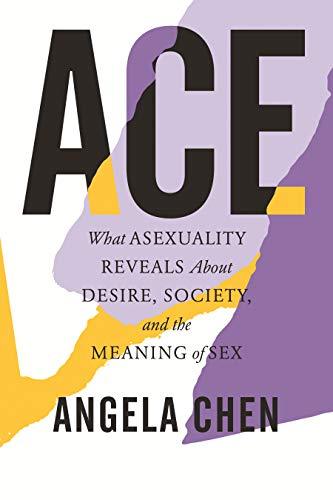

Ace: What Asexuality Reveals About Desire, Society, and the Meaning of Sex by Angela Chen
An engaging exploration of what it means to be asexual in a world that's obsessed with sexual attraction, and what we can all learn about desire and identity by using an ace lens to see the world. Through interviews, cultural criticism, and memoir, ACE invites all readers to consider big-picture issues through the lens of asexuality, because every place that sexuality touches our world, asexuality does too.
The Invisible Orientation: An Introduction to Asexuality by Julie Sondra Decker
In The Invisible Orientation, Julie Sondra Decker outlines what asexuality is, counters misconceptions, provides resources, and puts asexual people's experiences in context as they move through a very sexualized world. It includes information for asexual people to help understand their orientation and what it means for their relationships, as well as tips and facts for those who want to understand their asexual friends and loved ones.

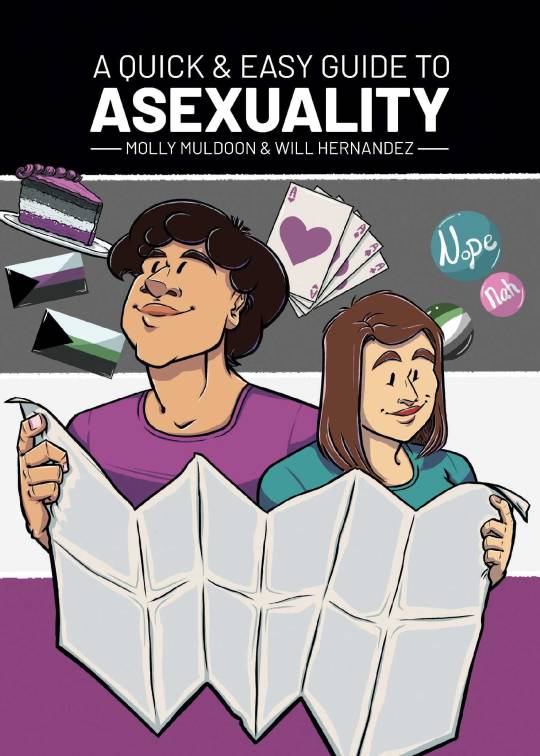
How to Be Ace: A Memoir of Growing Up Asexual by Rebecca Burgess
In this brave, hilarious and empowering graphic memoir, we follow Rebecca as they navigate a culture obsessed with sex—from being bullied at school and trying to fit in with friends, to forcing themself into relationships and experiencing anxiety and OCD—before coming to understand and embrace their asexual identity.
A Quick & Easy Guide to Asexuality by Molly Mulldoon and Will Hernandez
Writer Molly Muldoon and cartoonist Will Hernandez, both in the ace community, are here to shed light on society’s misconceptions of asexuality and what being ace is really like. This book is for anyone who wants to learn about asexuality, and for Ace people themselves, to validate their experiences. Asexuality is a real identity and it’s time the world recognizes it. Here’s to being invisible no more!


Asexualities: Feminist and Queer Perspectives edited by Karli June Cerankowski and Megan Milks
As the first book-length collection of critical essays ever produced on the topic of asexuality, this book serves as a foundational text in a growing field of study. It also aims to reshape the directions of feminist and queer studies, and to radically alter popular conceptions of sex and desire. Including units addressing theories of asexual orientation; the politics of asexuality; asexuality in media culture; masculinity and asexuality; health, disability, and medicalization; and asexual literary theory, Asexualities will be of interest to scholars and students in sexuality, gender, sociology, cultural studies, disability studies, and media culture.
Refusing Compulsory Sexuality: A Black Asexual Lens on Our Sex-Obsessed Culture by Sherronda J. Brown
In this exploration of what it means to be Black and asexual in America today, Sherronda J. Brown offers new perspectives on asexuality. She takes an incisive look at how anti-Blackness, white supremacy, patriarchy, heteronormativity, and capitalism enact harm against asexual people, contextualizing acephobia within a racial framework in the first book of its kind. A necessary and unapologetic reclamation, Refusing Compulsory Sexuality is smart, timely, and an essential read for asexuals, aromantics, queer readers, and anyone looking to better understand sexual politics in America.
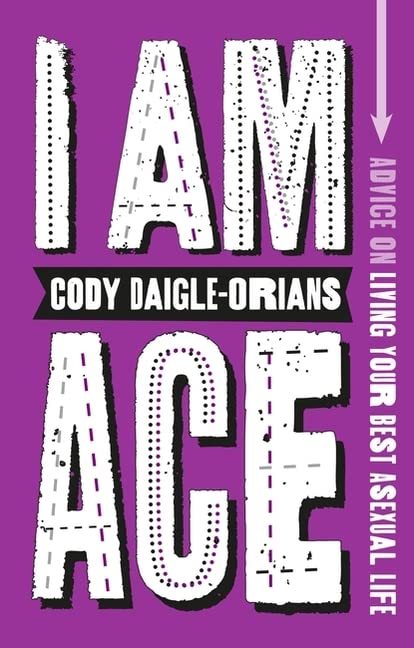

I Am Ace: Advice on Living Your Best Asexual Life by Cody Daigle-Orians
Within these pages lie all the advice you need as a questioning ace teen. Tackling everything from what asexuality is, the asexual spectrum and tips on coming out, to intimacy, relationships, acephobia and finding joy, this guide will help you better understand your asexual identity alongside deeply relatable anecdotes drawn from Cody's personal experience. Whether you are ace, demi, gray-ace or not sure yet, this book will give you the courage and confidence to embrace your authentic self and live your best ace life.
Ace Voices: What it Means to Be Asexual, Aromantic, Demi or Grey-Ace by Eris Young
Drawing upon interviews with a wide range of people across the asexual spectrum, Eris Young is here to take you on an empowering, enriching journey through the rich multitudes of asexual life. With chapters spanning everything from dating, relationships and sex, to mental and emotional health, family, community and joy, the inspirational stories and personal experiences within these pages speak to aces living and loving in unique ways. Find support amongst the diverse narratives of aces sex-repulsed and sex-favourable, alongside voices exploring what it means to be black and ace, to be queer and ace, or ace and multi-partnered - and use it as a springboard for your own ace growth.
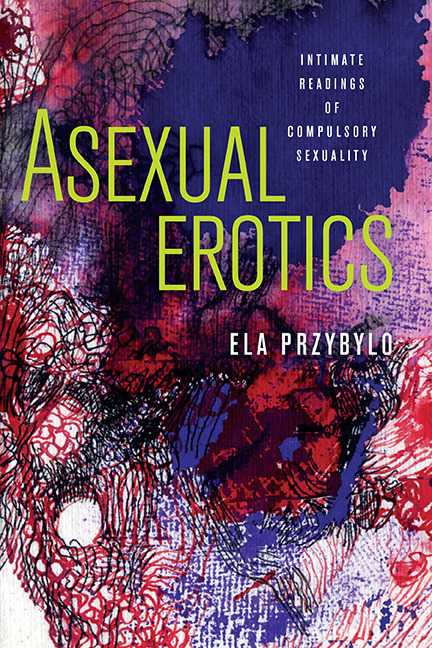

Asexual Erotics: Intimate Readings of Compulsory Sexuality by Ela Przybylo
Through a wide-ranging analysis of pivotal queer, feminist, and anti-racist movements; television and film; art and photography; and fiction, nonfiction, and theoretical texts, each chapter explores asexual erotics and demonstrates how asexuality has been vital to the formulation of intimate ways of knowing and being. Asexual Erotics assembles a compendium of asexual possibilities that speaks against the centralization of sex and sexuality, asking that we consider the ways in which compulsory sexuality is detrimental not only to asexual and nonsexual people but to all.
Ace Notes by Michele Kirichanskaya
As an ace or questioning person in an oh-so-allo world, you're probably in desperate need of a cheat sheet. Covering everything from coming out, explaining asexuality and understanding different types of attraction, to marriage, relationships, sex, consent, gatekeeping, religion, ace culture and more, this is the ultimate arsenal for whatever the allo world throws at you.


Ace and Aro Journeys: A Guide to Embracing Your Asexual or Aromantic Identity by The Ace and Aro Advocacy Project
Join the The Ace and Aro Advocacy Project (TAAAP) for a deep dive into the process of discovering and embracing your ace and aro identities. Empower yourself to explore the nuances of your identity, find and develop support networks, explore different kinds of partnership, come out to your communities and find real joy within. Combining a rigorous exploration of identity and sexuality models with hundreds of candid and poignant testimonials - this companion vouches for your personal truth, wherever you lie on the aspec spectrum.
Sounds Fake But Okay: An Asexual and Aromantic Perspective on Love, Relationships, Sex, and Pretty Much Anything Else by Sarah Costello and Kayla Kaszyca
Drawing on Sarah and Kayla's personal stories, and those of aspec friends all over the world, prepare to explore your microlabels, investigate different models of partnership, delve into the intersection of gender norms and compulsory sexuality and reconsider the meaning of sex - when allosexual attraction is out of the equation.
2K notes
·
View notes
Text
[“As history has shown, and as I was at the time experiencing, a strap-on can be sexy, but it can also be a failure and a threat. It draws attention to how contradictory and fragile our definitions of male and female are, and how tightly we cling to them, even in relationships between women, where gender and sexuality are more flexible.
I think it’s important to look at how this played out, not just in the history of straight men policing lesbians but in the lesbian community policing itself. In the 1940s and 50s a bar scene began to develop in cities across the country, marking the first time when lesbians, particularly working-class ones, gathered publicly and in large numbers. During this time a butch/femme culture developed that included strict codes of dress and behavior both in and outside the bedroom. Butch women slicked back their hair, wore suits and jeans, and were, generally, the “givers” of sexual pleasure. Femme women wore dresses and makeup and were the “receivers” of sexual pleasure. In some ways, this culture was liberating, as it represented a powerful, cohesive group aesthetic and safety in numbers. Especially for women who actually identified as butch, it was also a chance to finally adopt masculine dress without being seen as failed or dangerous but rather as sexy and loveable. For others this culture was a trap, pushing women into restrictive sex and gender roles in the same ways heterosexuality had. It is by no means the only lesbian aesthetic, but I think part of the reason it has stuck around for so long in the popular imagination as the way lesbians are is because it allows straight people to again see themselves as the center of the sexual world.
In either case, strap-ons were not widely used, or at least not talked about. In Boots of Leather, Slippers of Gold, a book that documents the lives of Black and white lesbians in Buffalo, there is a pretty exhaustive set of interviews about sex acts and terminology, but no one mentions owning, liking, or even trying sex with a strap-on. Indeed, the one mention of a dildo is one of bewilderment as Vic, a self-identified butch, talks about her friend pulling her into the bathroom to show her the new strap-on she got. “Jesus, she whipped this thing out . . . I’m supposed to be butch and my face felt like a neon sign. I could feel the embarrassment. How do you admire a dildo? No seriously, what do you say?”
Butches in the book took great pride “in their own hands and their ability to please,” which “did not dispose them to think that a dildo would improve their lovemaking.” It’s interesting that they considered the dildo less potent and successful than hands. This could be read as displacing the power of the dick, but, coupled with the silence surrounding strap-on use, it also points to a greater fear about the lesbian body. How regulated and small it had to be to exist. How easily it could be diminished by something outside itself, or destroyed altogether.
In the lesbian radical feminist movement of the 1960s and 70s, there was also a great deal of attention focused on creating distance from dicks. Jill Johnston argued in A Lesbian Nation that the only true road to female liberation was the conscious “withdrawal at every level from the man to develop woman supremacy.” This meant that not only butch/femme dynamics but also penetrative sex were out. Anne Koedt developed the theory that the vaginal orgasm was a myth perpetrated by Freud in order to center male sexual desire for penetration, though her evidence for this was a study done by Kinsey—a man—that found the vagina was not particularly sensitive to touch. True orgasms, Koedt argued, only came from the clitoris—even though she interestingly also called the clit “the female equivalent of the penis”—so if women wanted to have enjoyable sex there was no need for penetration, only clitoral stimulation. Andrea Dworkin went so far as to call the penis “a hidden symbol of terror” and argued that “violence is male, the male is the penis.”
Dorothy Allison writes about the effects this had on herself and other lesbians at the time. “No one admitted to using dildos, wanting to be tied up, wanting to be penetrated, or talking dirty—all that male stuff . . . my lover wanted us to perform tribadism, stare into each other’s eyes, and orgasm simultaneously. Egalitarian, female, feminist, revolutionary.” In attempting to free themselves from the penis, in many ways radical lesbians ended up reinscribing the power of the dick and sacrificing the range of sexual pleasure they could experience in the process.
In a counter to this, the lesbian sexual outlaws of the 1970s, 80s, and 90s argued that dildos were actually great, not problematic, but primarily because they didn’t reference the penis at all. Some even argued that wearing a dildo turns a woman into a cyborg, not woman, man, or even human, just a body involved in the mechanistic movements of giving and receiving pleasure. While there is something freeing about this argument, as it gets us out from under the idea that we can’t talk about strap-ons and that a woman wearing a strap-on is only trying to make up for a never-ending lack, it still bypasses the sticky, complicated reality of the gendered/human world we live in and the simple fact that sometimes lesbians want strap-ons to look like penises.
All of this begs the question: can a dyke wear a dick and just have some damn fun?”]
amy gall, from my dick, your dick, our dick, from wanting: women writing about desire, 2023
406 notes
·
View notes
Text
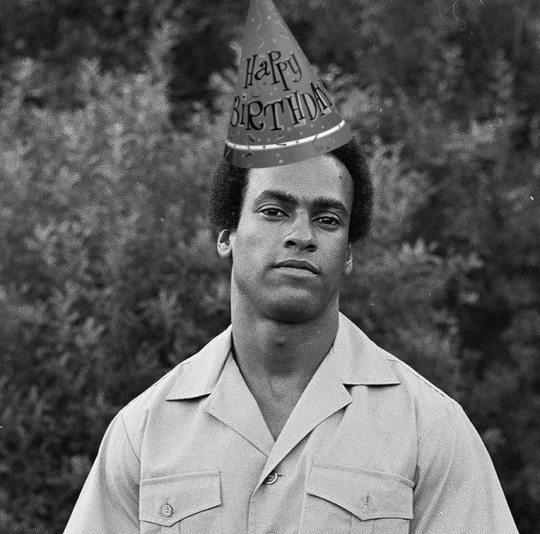
Happy birthday, Huey P. Newton! (February 17, 1942)
A founder of the Black Panther Party, Huey P. Newton was a revolutionary and a radical whose ideas influenced a generation of Black and leftist activists. Born in Monroe, Louisiana, Newton moved with his family to Oakland during the Second Great Migration of Black Americans from the South in response to racial prejudice and anti-Black violence. Newton learned to read by studying Plato's Republic, and he retained a political and philosophical mindset throughout his life. While studying at Merritt College in Oakland, Newton read the works of Marx, Lenin, Fanon, Malcom X, and Mao, among others, which further influenced him towards left-wing and revolutionary politics. While still a student, he met Bobby Seale, and the two co-founded the Black Panther Party, crafting its Ten-Point Program together. The BPP's program demanded housing, healthcare, employment, and revolutionary education for Black people, as well as an end to police brutality, imperialism, and capitalism. Newton's BPP began a number of social programs in the Bay Area, including providing food and education to impoverished Black youth. The BPP also became known for its focus on armed community defense, with Newton in particular a strong advocate for the right of Black people to self-defense. Newton also used his leadership position within the BPP to advocate for the rights of women and gay people, embracing them as equal partners in the struggle for liberation. Newton was arrested in 1967 for voluntary manslaughter, but a public pressure campaign contributed to the charges being dropped, and he subsequently was invited to visit China, where he met with Zhou Enlai. Newton was murdered in 1989; a man named Tyrone Robinson was convicted of the act. Newton left behind a large body of work, including his autobiography, Revolutionary Suicide.
"Revolutionary suicide does not mean that I and my comrades have a death wish; it means just the opposite. We have such a strong desire to live with hope and human dignity that existence without them is impossible. When reactionary forces crush us, we must move against these forces, even at the risk of death."
1K notes
·
View notes
Text
"How to Go Mad is animated by deep concern for black people, mad people, and other beleaguered beings. If this project brings attention to people who have been persecuted because of their blackness and/or/as madness; if it alerts rationalist readers to the grave repercussions of demeaning the mentally ill; if it teaches techniques for practicing ethical, radical, critical, and beautiful madness; if it instigates righteous rage in the interest of social transformation; if it broadens understanding of who and what comprises a black radical tradition; if it encourages black studies to more carefully address madness; if it prompts mad studies to think more rigorously through blackness; if it urges black studies and mad studies to join forces; if it testifies to the possibility of bearing fruit in a "fruitless expanse" and finding home "nowhere at all"; if it models radical compassion; if it urges us toward liberation; or if it simply contributes to someone's relief or healing, then, to my mind, this book succeeds.
For some, healing might mean banishing madness. For others, healing might mean harnessing madness and putting it to good use--a readiness to rally the voices inside one's head rather than silence them. "
-How To Go Mad Without Losing Your Mind: Madness and Black Radical Creativity, 2021. By La Marr Jurelle Bruce, pg 34.
272 notes
·
View notes
Note
are there any books i can read to learn more about university abolition?
Fred Moten and Stefano Harney, The Undercommons: Fugitive Planning and Black Study (Brooklyn: Minor Compositions, 2013) [link: open access pdf]
Dylan Rodriguez, “Racial/colonial Genocide and the Neoliberal Academy: In Excess of a Problematic.” American Quarterly 64.4 (2012)
la paperson, A Third University Is Possible (Minneapolis: University of Minnesota Press, 2017)
The Imperial University: Academic Repression and Scholarly Dissent. Edited by Piya Chatterjee and Sunaina Maira. Minneapolis: University of Minnesota Press, 2014
Review essay: "Critical University Studies and the Crisis Consensus." Abigail Boggs and Nick Mitchell. Feminist Studies 44 (2): 432-463 (2018)
Clyde W. Barrow, Universities and the Capitalist State: Corporate Liberalism and the Reconstruction of American Higher Education, 1894-1928 Madison: University of Wisconsin Press. 1990
Eli Meyerhoff, Beyond Education: Radical Studying for Another World (Minneapolis: University of Minnesota Press, 2019).
418 notes
·
View notes